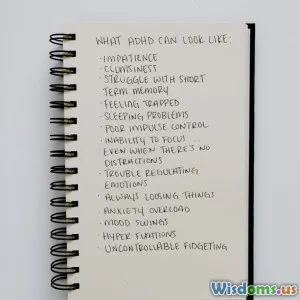
Are Smartphone Habits Harming Your Emotional Intelligence
9 min read Explore how smartphone habits impact your emotional intelligence and learn ways to maintain emotional well-being in the digital age. (0 Reviews)
Are Smartphone Habits Harming Your Emotional Intelligence?
In today's hyper-connected world, smartphones have seamlessly integrated into almost every facet of our lives. From casual chats to professional networking, these devices offer unprecedented convenience—but at what cost? Emerging research suggests that constant engagement with smartphones may subtly erode emotional intelligence (EI), a vital skill that governs how we perceive, understand, and manage both our emotions and those of others. This article delves into the complex relationship between smartphone habits and emotional intelligence, illuminating the psychological repercussions of our screen obsession and offering practical ways to safeguard our emotional health.
Understanding Emotional Intelligence
Before we dissect how smartphones come into play, it’s crucial to grasp what emotional intelligence entails. Coined by psychologist Daniel Goleman in the mid-1990s, EI refers to a set of competencies including self-awareness, self-regulation, empathy, social skills, and motivation. Unlike pure cognitive intelligence measured by IQ, EI reflects our ability to navigate interpersonal complexities and maintain emotional balance.
High EI correlates with better decision-making, stronger relationships, enhanced resilience, and even career success. For instance, a manager with robust emotional intelligence can mediate conflicts with sensitivity and inspire team morale, unlike one who reacts impulsively.
The Digital Disruption: Smartphones and Emotional Disconnect
1. Erosion of Face-to-Face Interaction Skills
Smartphones foster constant virtual communication—texts, social media, emojis, and gifs—but reduce in-person exchanges. According to a 2020 survey by Common Sense Media, the average teen spends over seven hours daily on screens, much of it passive consumption rather than meaningful interaction.
Why does this matter? Emotional intelligence heavily depends on nonverbal cues such as eye contact, facial expressions, and vocal tone, which are muted or absent in digital messages. A 2019 study published in the Journal of Social and Personal Relationships found that heavy smartphone users performed worse on tests measuring emotion recognition and empathy compared to those favoring face-to-face communication.
For example, a friend might text "I'm fine," but without vocal inflection or body language, interpreting true feelings becomes guesswork, leading to misunderstandings or emotional distancing.
2. The Dopamine Loop and Emotional Regulation
Smartphone apps employ design strategies that trigger dopamine releases—pleasurable brain chemicals linked to reward seeking. While this system encourages engagement, it may impair our ability to regulate emotions effectively. The constant ping of notifications can create anxiety, impatience, and distraction, detracting from mindfulness and emotional control.
A clinical experiment demonstrated that participants restricted from using their phones for 24 hours reported increased mood stability and less emotional reactivity. In contrast, those continuously bombarded by alerts experienced heightened stress and difficulty focusing.
3. Social Comparison and Its Toll on Empathy
Platforms like Instagram and Facebook often project curated, idealized versions of life. Psychologist Jean Twenge’s extensive research on digital natives links heavy social media consumption to increased feelings of loneliness and decreased empathy.
When users compare themselves to filtered images and upbeat status updates, they may develop envy or self-criticism rather than compassion. This emotional disconnect reduces motivation to understand and relate to others’ experiences genuinely—a key facet of EI.
4. Multitasking and Cognitive Overload
Smartphones encourage multitasking—shifting rapidly between apps, conversations, and notifications. While users may perceive this as efficiency, cognitive psychology suggests it fragments attention and exhausts working memory.
In a classic 2007 study by Rubinstein, Meyer, and Evans, multitasking significantly slowed information processing and impaired task switching. Applied to social scenarios, diminished focus hampers our ability to listen empathetically and respond thoughtfully, undermining emotional attunement.
Reclaiming Emotional Intelligence in the Smartphone Era
Recognizing the impact of our phone habits is the first step toward preserving emotional intelligence. Below are evidence-based strategies to balance technology use with emotional health:
1. Prioritize Offline Interactions
Scheduling regular in-person catch-ups can recalibrate emotional skills. Even short face-to-face conversations can enhance empathy and emotional awareness. Consider phone-free meals or daily walks without devices.
2. Practice Mindful Smartphone Use
Apps like Forest and Moment help limit screen time and encourage focus. Setting specific times for checking messages or social media prevents compulsive behavior. Mindfulness meditation also strengthens self-regulation, improving responses to emotional triggers.
3. Enhance Emotion Recognition Skills
Engage in exercises that sharpen perception of non-verbal cues, such as watching videos with muted dialogue to interpret emotions or using facial expression flashcards. Training programs have demonstrated improvements in EI among professionals and students alike.
4. Reflect on Social Media Content Critically
Recognize the curated nature of online platforms and maintain realistic perspectives about others’ lives. Engage with content that promotes positivity and empathy, such as personal stories or charitable initiatives.
5. Set Technology Boundaries
Designate "tech-free zones" (e.g., bedroom, dining room) or times (e.g., before bed) to reduce cognitive overload and foster restful states conducive to emotional regulation.
Conclusion
Smartphones unquestionably enrich our lives in many ways, yet without mindful usage, they harbor hidden threats to our emotional intelligence. The nuanced, intimate skills that allow us to connect deeply and navigate complex emotional landscapes risk erosion amidst screens and notifications. By understanding these dynamics and implementing intentional habits, we can harness technology's benefits without sacrificing the cherished human capacities for empathy, self-awareness, and emotional resilience.
Embracing this balance isn’t merely about personal well-being; it’s about preserving the essential fabric of human connection in an increasingly digital world. As writer and educator Parker Palmer aptly put it, "Knowing yourself is the beginning of all wisdom"—and cultivating emotional intelligence, even in the smartphone age, remains vital to lifelong learning and genuine relationships.
References
- Goleman, D. (1995). Emotional Intelligence: Why It Can Matter More Than IQ. Bantam Books.
- Common Sense Media (2020). The Common Sense Census: Media Use by Tweens and Teens.
- Misra, S., Cheng, L., Genevie, J., & Yuan, M. (2016). The iPhone effect: The quality of in-person social interactions in the presence of mobile devices. Environment and Behavior.
- Twenge, J. M. (2017). IGen: Why Today’s Super-Connected Kids Are Growing Up Less Rebellious, More Tolerant, Less Happy.
- Rubinstein, J. S., Meyer, D. E., & Evans, J. E. (2001). Executive control of cognitive processes in task switching. Journal of Experimental Psychology.
- Park, G., Van Bavel, J. J., & Chung, S. (2014). Mindfulness training improves emotional regulation and social connection.
Rate the Post
User Reviews
Popular Posts





















